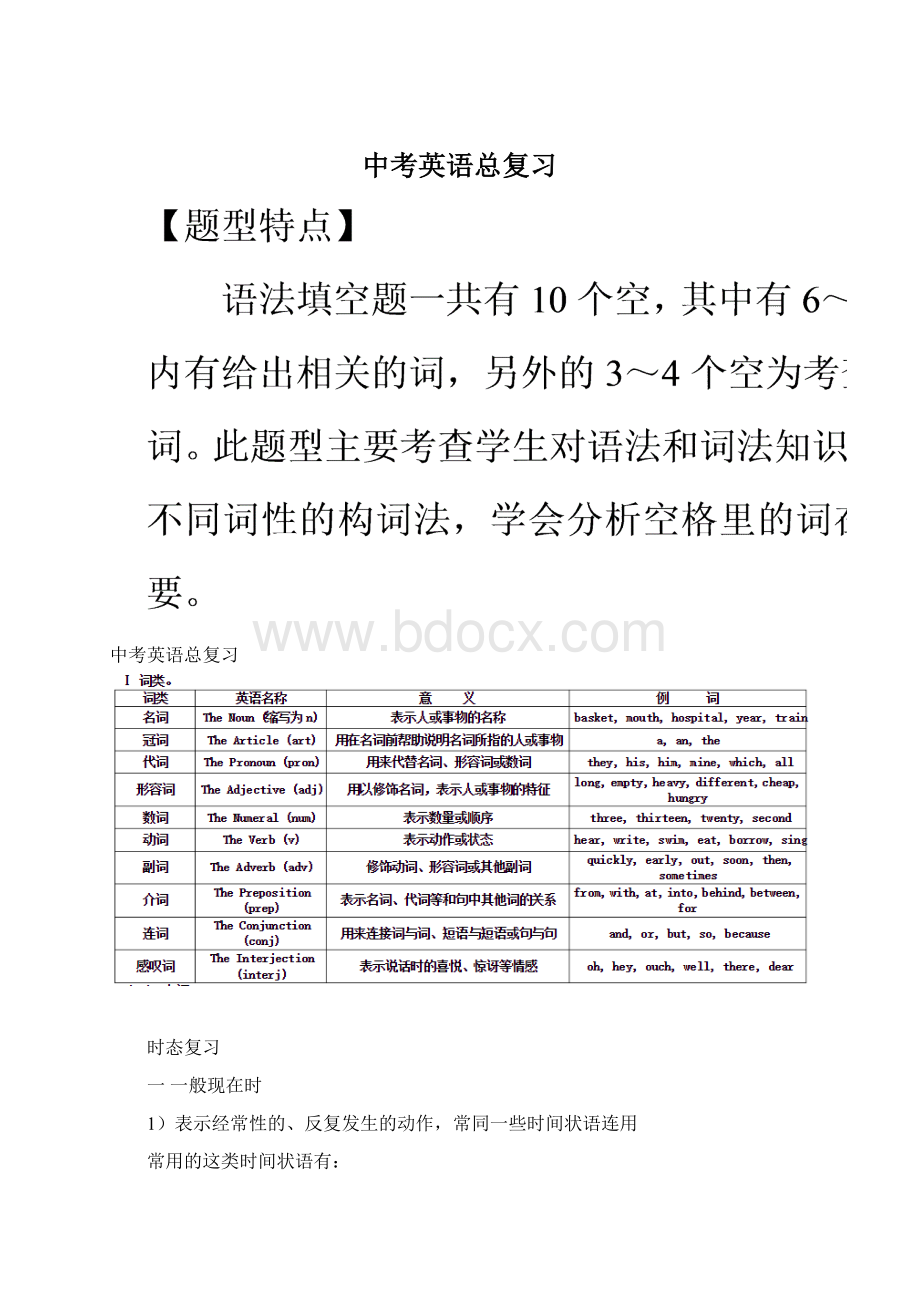中考英语总复习.docx
《中考英语总复习.docx》由会员分享,可在线阅读,更多相关《中考英语总复习.docx(55页珍藏版)》请在冰豆网上搜索。

中考英语总复习
中考英语总复习
时态复习
一一般现在时
1)表示经常性的、反复发生的动作,常同一些时间状语连用
常用的这类时间状语有:
sometimes(有时候),seldom(很少),everyday(每天),always(总是),often(经常),usually(通常),everyweek(每周),everyyear(每年),onceaweek(每周一次),twiceamonth(每月两次),never(从不)fromtimetotime(不时地),onSundays(星期天)
Iusuallyhavebreakfastathalfpastsix.我通常6点半吃早饭。
Iseldomgotothemovies我很少去看电影
2)表示现在的状态或主语的特征、习惯、职业
Sheisill.她病了。
Helookstired.他看上去累了。
例.-DoyouknowifFrankwilldrivetoItalythisweekend?
-Frank?
Never!
He_________driving.
AhashatedB,hatedC.willhateD.hates
3)表示客观真理,也用于格言、谚语中
Lightgoesfasterthansound.光比声音传得快。
Waterboilsat100℃.水在100摄氏度沸腾。
Springfollowswinter.冬去春来。
Thesunrisesintheeastandsetsinthewest.太阳从东方升起,在西方落下。
Anappleadaykeepsthedoctoraway.天天一苹果,医生远离我。
Wherethereisawill,thereisaway.有志者事竟成。
Agoodmedicinetastesbitter.良药苦口利于病。
主句为过去时,表示客观真理的宾语从句也用一般现在时
Theteachersaidthatthesunisbiggerthanthemoon.老师说,太阳比月亮大。
例:
Thephysicsteachersaidthatlight_________muchfasterthansound.
A.willtravelB.wastravelingC.travelsD.traveled
4)用在由when,until,assoonas,if等引导的时间状语从句和条件状语从句中,表示将来的动作(主将从现)
Hewilltellyouthenewswhenhegetsback.他回来后将把消息告诉你。
We’llwaithereuntiltherainstops.我们将在这里等到雨停。
Ifitrainstomorrow,Iwillgohome.
易错点:
对主语的数判断有误
举例:
LiMingwithmeare(be)inBeijing.
解析:
表面一看是“我和李明两个人在北京”,但with在此做伴随状语,不能作主语,故用is。
同类:
togetherwith,alongwith
【练习题】
1.Ifit__________(notrain)tomorrow,we____________(go)fishing.
2.Mikesayshe_________(want)tobeaworkerafterhe _________(finish)school.
3.Light___________(travel)muchfasterthansound.
4.I_________(be)afraidMrJohnson__________(notvisit)out schooltomorrow.
5.Theteachersaidthattheearth________(move)roundthesun.
二现在进行时
构成方式is/am/are+现在分词(V-ing)
1)表示现在说话时正在进行的动作(标志词:
now,rightnow,listen,look....)
Iamlisteningtotheradionow.我正在听广播
Look!
Themonkeyisclimbingthetree.瞧,猴子在爬树。
Listen!
Someoneissinginginthepark.听,有人在公园里唱歌。
Whoiscleaningthewindow?
谁在擦窗户?
2)表示现阶段正在进行的动作(但说话时不一定在进行),常同thesedays(这几天),thisweek(本
周),atpresent(目前)等连用
Sheisreviewingherlessonsthesedays.这些天她在复习功课。
Iamwritingapaperoncityplanningthisweek.本周我在写一篇关于城市规划的论文。
HeisstudyingEnglishattheuniversity.他正在大学里学习英语。
(现阶段)。
3)现在进行时有时同always,forever,continually连用,表示某种感情色彩,如赞扬、不满等
Heisalwaysthinkingofothers.他总是为别人着想。
(赞扬)
Themanisalwaysmakingtrouble.那人总是找麻烦。
(责备)
4)begoingto+动词原形
这种句型表示“打算,准备”做某事或即将发生某事。
Sheisn’tgoingtoattendthemeeting.她不打算参加会议
5)某些表示感官的动词表示说话时的感觉要用一般现在时,不用现在进行时
这类动词有:
see(看见,明白),hear(听见),smell(闻到,闻起来),taste(尝起来),sound(听起来),feel
(摸起来)等
Ihearingsomeoneshoutingoverthere.(误)
(正)______________________________________________________我听见有人在那边喊
【练习题】
1. You________(watch)TVaftersupper,aren’tyou?
2. They________(plant)treesonthehill.Doyousee?
3. Look!
Someone________(lie)onthefloor.
4. It__________(rain)hardernow.It________(rain)quiteofteninsummer.
5.I____________(prepare)thefinalrecently.
三一般过去时
1)表示过去某时发生的动作或存在的状态,常同确定的过去时间状语连用
这类时间状语有
yesterday(昨天),lastnight(昨晚),afewmonthsago(几个月前),thelasttime(上次),lastsummer(去年夏天),threedaysago(3天前),lastweek(上周),theotherday(前几天),justnow(刚オ),
onceuponatime(从前),inthepast(过去),in2003(在2003年),whenIwassevenyearsold(我7岁时)
Shewasbusyyesterday.她昨天很忙。
Hewasabusdriveryearsago.几年前他是个公交车驾驶员。
2)有时虽没有表示过去时间的状语,但上下文表示的是过去的动作,也要用一般过去时
Iforgottoposttheletter,我忘了寄信了
注意:
描写已故人的行为或状态,要用一般过去时
例:
ColumbusdiscoveredAmerica.哥伦布发现了美洲。
考1.-Where___you__________lunch?
-Athome.Therewasnoschoollunch
A.did:
haveB.are;havingC.will:
haveD.do:
have
2.-IhearSamhasgonetoOingdaoforhisholiday
Oh,hownice!
Doyouknowwhenhe_________
A.LeftB.wasleavingC.hasleftD.hadleft
3)表示过去经常、反复发生的动作
Sheusuallytookawalkalongtheriverinthemorningwhenshelivedhere.她住在这里时,早上经常沿着河边散步。
公园。
4)usedto+动词原形,表示过去的习惯,该习惯现在已终止
Sheusedtoworkinabookstore.她从前在一家书店工作。
(现在已不在那里工作)
HeusedtoreadEnglishforhalfanhourinthemorning.他过去早上读半个小时英语
5)在“现在完成时主句+Since+一般过去时从句”句式中,Since后的从句要用一般过去时
IhavelearntalotsinceIcamehere.我自来这里后学到了很多东西。
例:
Greatchangeshavetakenplacesincewe________E-times.Andthecomputeriswidelyusedthroughouttheworld
A.willenterB.enteredC.wereenteringD.haveentered
【练习题】
1.I__________(feel)muchbetterafterI_______(take)the medicine.
2.I_________(lost)mybike._________you_________(see)it anywhere?
3.Where________yourwatch_________(lose)?
4.“Where_________(be)youlastnight?
”“I_________(ask)tohelpTomathome”
5.“Where________(be)youthistimeyesterday?
”
四一般将来时
构成方式:
You/He/She/lt/They+will+动词原形
在美式英语中,各人称均可用will
基本用法
1)shall和will表示将来发生的动作或情况,指单纯的将来
常同下列时间状语连用
tomorrow(明天),thedayaftertomorro